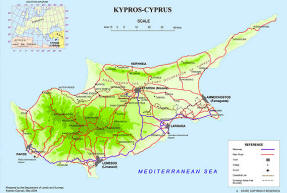|
Cyprus (Kypros) |
Currency: The currency of the Republic is the Cyprus pound - CY₤, which is divided into 100 cents. Notes and coins currently in circulation are as follows:
Banknotes: CY₤20, CY₤10, CY₤5, CY₤1 Coins: 1 cent, 2 cents, 5 cents, 10 cents, 20 cents, 50 cents Commercial Banks quote the exchange rates of the Cyprus Pound against all major foreign currencies daily.
Credit Cards: All major credit cards as well as Travellers Cheques are recognized and accepted in most Cypriot hotels, shops, travel and car rental agencies and restaurants. Stickers in front windows will advise you as to which cards are acceptable. You can cash your travellers Cheques in all Cypriot, foreign banks and big hotels, but do not forget to have your passport with you. Identification is necessary for all transactions.
Currency Exchange: Exchange rates fluctuate daily so you will need to find out the current rate before exchanging your money. You can do this by calling any Cypriot or foreign bank. All major International banks have branches in Lefkosia (Nicosia), Lemesos (Limassol), Larnaka, and Pafos. Banking Hours: banks are open from Monday to Friday, from 8:00 - 13:00. Credit banks: currency exchange dispensers operate 24 hours/day.
Time: Cyprus time is seven hours ahead of Eastern Standard Time, 2 hours ahead of Greenwich Mean Time and an hour ahead of Central Europe Time. Along with the rest of continental Europe, the clock is advanced one hour during summer, from the end of March to the end of September, almost a month earlier than the UK, the US and Canada. Therefore keep in mind that the time difference with these countries is one hour greater for some weeks in April and October.
Climate: You will find the Cypriot climate generally mild. Cyprus has a warm Mediterranean climate with breezy winds close to the coast and cooler summer nights. An outstanding feature of the Cypriot climate is its ample sunshine, estimated to be 3,000 hours per year! Winters are mild and the rain season is between November and March. Following are the average temperatures for Cyprus:
Outlet Plugs: The outlet plugs in Cyprus are of 240 Voltage and type G (as in UK).
Usuful Links: |
|||||||||||||||||||||||||||||
|
Cyprus, the legendary birthplace of Aphrodite, is an island situated in the North-Eastern basin of the Mediterranean Sea, at the crossroads of Europe, Africa and Asia. The legend of the birth of Aphrodite, emerging through the foam of the sea waves, can be compared to the geological birth of Cyprus, in the sense that the island rose from the ocean. The nucleus of this phenomenon is the mountain range of Troodos, which is 92 million years old. The rocks of Troodos were created from the ancient oceanic bark, which started rising from the sea 10 million years ago. First emerged from the sea the Troodos massif on to which limestone sediment began to attach gradually leading to a drop in the depth of the seas. The last to become attached was the Pendadactylos range to the north of the Troodos massif. Cyprus emerged from the sea 1,85 million years ago.
Cyprus
is a country where 21st century still rubs shoulders with history.
It is an island with great diversity, combining western bustle and
eastern calm. Cosmopolitan hotels, restaurants and nightclubs
coexist with quiet mountain villages seemingly untouched by the 21st
century. The island's strategic location has been a major factor in
shaping its history throughout the centuries and, in recent years,
its development into a centre for international business. This
sun-drenched island has been at the crossroads of world events for
centuries. Greek, Roman, Byzantine and British influences have all
had a bearing on life in Cyprus. 10,000 years of history and culture
have left Cyprus a heritage rich in historical and artistic
treasures - Byzantine monasteries, ruins of Greek and Roman
monuments and Venetian castles.
The people of Cyprus owe their individuality and warmth to the fact that they are the product of an amazingly colourful history. That's why Cypriots make visitors feel at home as soon as they step on the island.
|
||||||||||||||||||||||||||||||
